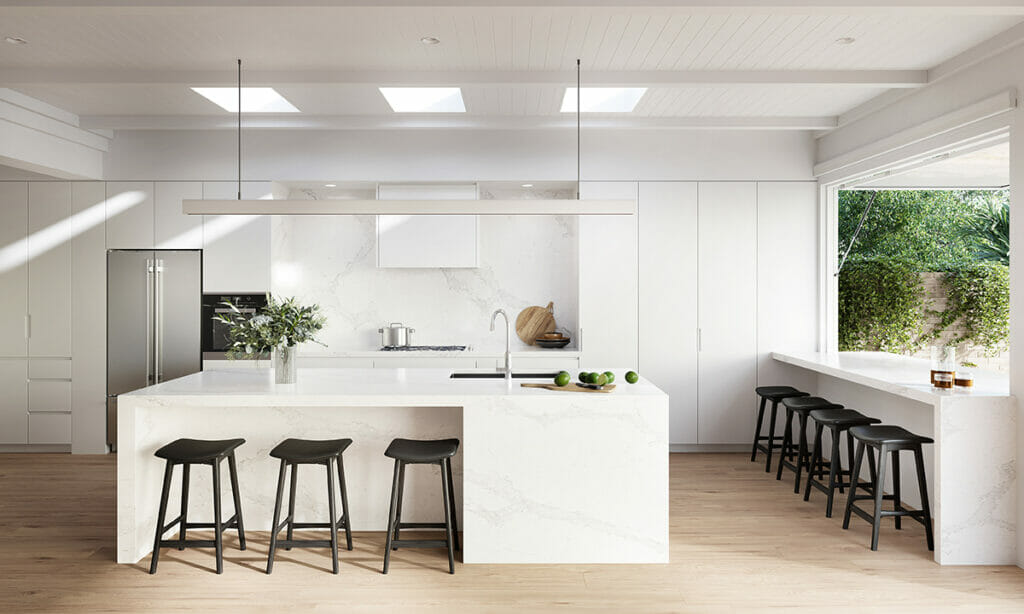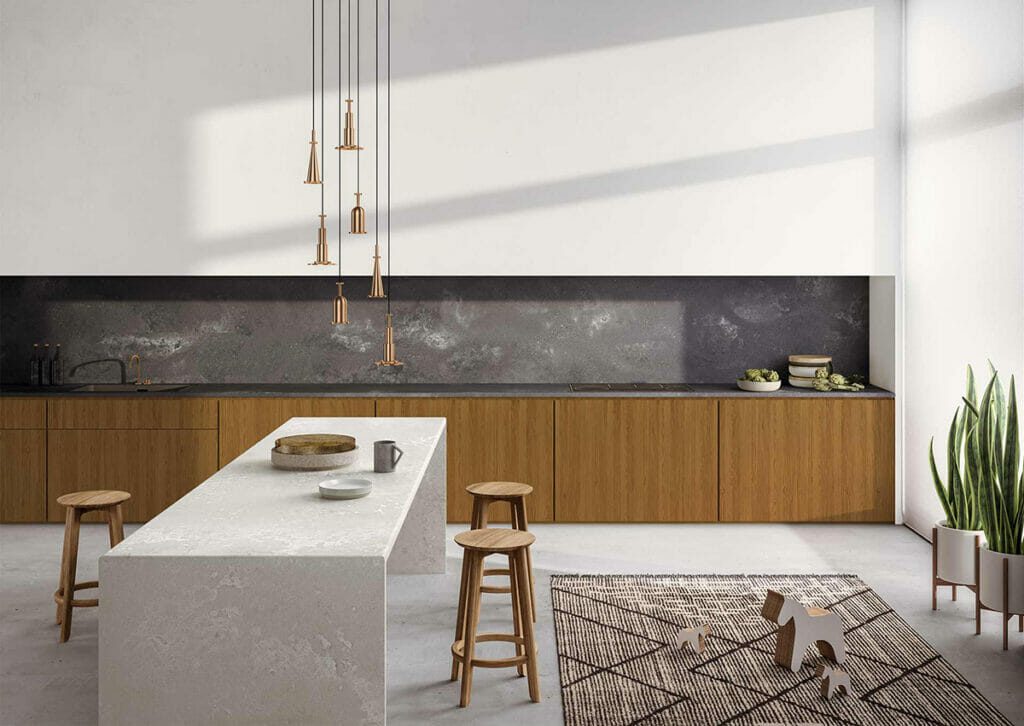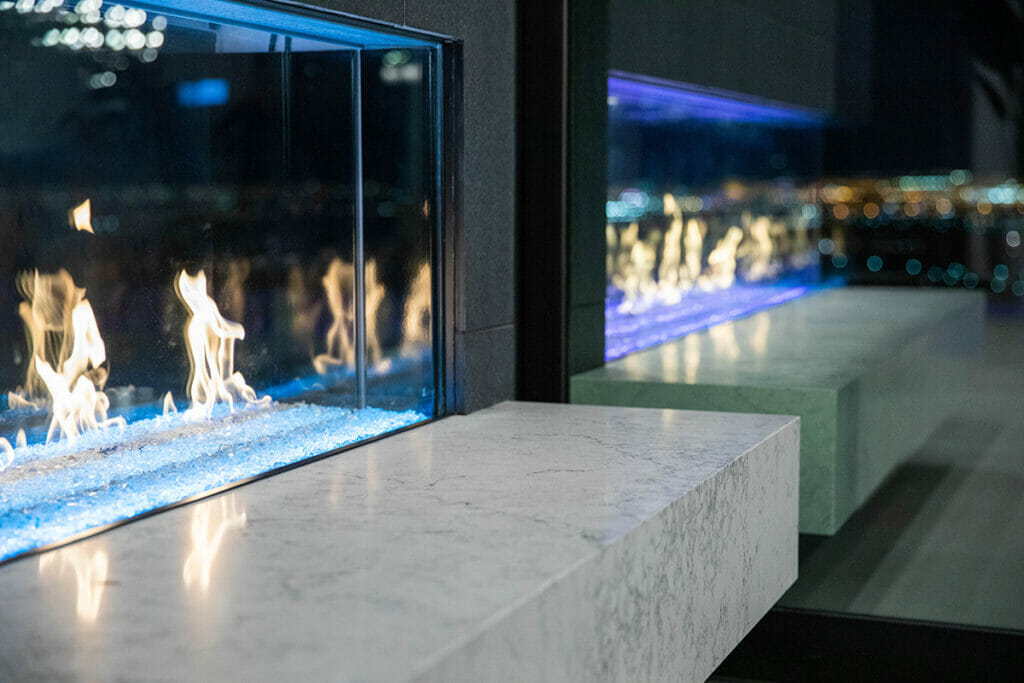6 Reasons Not to Buy Faux Quartz Countertops
5 min read

Quartz countertops are the most popular today and will continue to be over the next several years, according to the National Kitchen & Bath Association (NKBA) survey. Most homeowners can attest to quartz’s consistency and low maintenance, thus it’s the best material for countertops.
Unfortunately, as demand outpaces supply for quartz, counterfeits are also flooding the market. If you’re not attentive enough, you may end up buying faux quartz countertops.
While faux and real quartz can appear similar on the surface, faux quartz can cause plenty of problems to homeowners.
Here are six reasons to not buy Faux Quartz Countertops:
A genuine quartz countertop is 93% quartz compacted together with high-quality polymer materials and resins. The intense pressure, vibration, and vacuuming during the mixing create durable, non-porous, and color-consistent slabs.
With a faux countertop, resin pooling is highly evident. This means the slabs have inconsistencies, resulting in large pools of colored resin marring the counter surface.
The polymers and resins used in making real quartz countertops are utterly non-porous, meaning they should be stain-resistant. Good quartz is also chip and scratch-resistant since the resins and polymers used to make it are a little more flexible than natural stone. This is not the case with faux quartz.
While legitimate manufacturers of quartz strictly follow the ratios for the amount of quartz and resins used to produce quality products, most manufacturers of faux quartz don’t. They use inconsistent ratios with low quantities of quartz minerals and high percentages of resin. This can cause the slabs to bend during transportation and result in resin pooling.
Also, these inconsistencies mean that the slabs you’re buying are of low quality and will end up being a big disappointment in the long run.
Quartz is a material that is entirely consistent in terms of color and pattern. But faux quartz countertops will have inconsistency in these two vital features.
When you buy an imitation, there will be some level of dye lot variations from one slab to another. Faux quartz countertops dye lot variation will occur due to the amount of resin used, and thus the amount of pigment will tend to vary. These changes in pattern and color indicate the material isn’t reliable for use.
When planning to buy quartz, the first thing to consider is the size you want. Inconsistent thickness is another huge problem you may encounter with faux quartz countertops. The manufacturers of fake quartz may sell a slab that’s a few millimeters thinner or thicker than they indicate when packaging.
It’s vital to source your quartz countertop materials from genuine manufacturers and dealers you can rely on, like Caesarstone.
Inconsistencies may also occur on the price that is quoted. While the price may vary depending on the manufacturer, producers of faux quartz spike prices significantly on some slabs with specific thicknesses and colors if they discover the buyer wants one color and two different thicknesses for their counters.
Many manufactured products use volatile organic compounds (VOCs). These chemicals are regulated mainly when producing products that will be of use near edibles or in the kitchen. That’s because some substances may release gases over the first years of the products’ lifespan. For instance, the authorities are currently phasing out the use of formaldehyde in cabinetry.
When you buy countertops from faux dealers, they may not specify the chemicals used in manufacturing their material. This can have adverse effects on users in the long run.
Therefore, it’s essential to buy quartz countertops from legit manufacturers like Caesarstone to ensure that the quartz countertop material chosen is of high quality and is free from harmful chemicals.

How to Identify Quality Quartz
Checking the finish is one way to judge the quality of quartz stone. The finish characterizes stain resistance. The quickest way to find out is to draw on the quartz stone with a marker and see whether it can be wiped off.
If you can wipe it off quickly, it shows strong stain resistance and vice versa. An excellent surface finish which you can easily wipe a mark off indicates high resistance to stains, meaning it’s of legitimate quality.
Regular quartz stones also have ink-jet codes on their back. Always check to determine if it’s from a legit manufacturer.
Hardness is another determinant of the quality of the material. Quartz stone has a 7 degree level of hardness, making it wear and scratch-resistant.
To determine if it’s a legitimate quartz material, use a steel knife to draw on the surface. Genuine quartz will leave behind black lines (traces of steel), while a faux one will reveal white marks, indicating low hardness. The white lines appear because the plate isn’t as hard as steel.
Thanks to its characteristics, genuine quartz is resistant to high-temperatures. Due to large amounts of resin in quartz, temperatures under 300°C don’t deform or break it.
On the other hand, faux quartz will bend or char when exposed to high temperatures. To test this, hold a lighter or match to the surface. If no traces are left behind, it’s genuine. But if burn marks are left behind, it indicates the material is fake.
The acid test will also help decipher genuine quartz from a faux one. Pour a spoonful of white vinegar on the stone and wait for 30 seconds to see the reaction. If many tiny bubbles appear, the stone is fake.
The calcium carbonate present in fake quartz reacts with the white vinegar and thus produces bubbles. Don’t use aged vinegar for this test as it may not give reliable results.

Key Takeaway
When buying quartz countertops, it’s crucial to differentiate the real from the faux. Faux countertops crack and age quickly, absorb color, are low in price, and have a short service life. Purchasing quartz countertops from licensed manufacturers, dealers, or distributors can save you this trouble and the most reliable and safe quartz countertops are from Caesarstone.
{{ subtitle }}
{{ i.desc }}
{{ subtitle }}
{{ subtitle }}